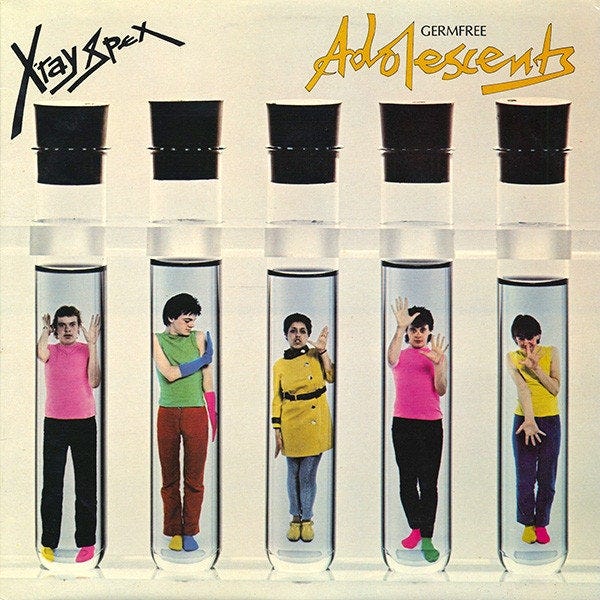Doing a poo at your friend's house
Lambrini Girls - 'Cuntology 101' (Who Let the Dogs Out, 2025)
In recent years, the British music scene has been shocked by a pandemic-induced comatose state and invigorated by the emergence of bands like Wet Leg, The Last Dinner Party, and now in 2025, Lambrini Girls. These groups, predominantly featuring female perspectives and personalities,1 bring a refreshing dynamism to an industry that has often been male-dominated. Lambrini Girls' rise is particularly noteworthy given the current economic climate, which poses significant challenges for emerging artists, and unlike those other two bands, they are signing about nepo-babies rather than batting away accusations of privileged upbringings.
Historically, British bands such as The Beatles, Roxy Music, The Smiths, Oasis, and Blur often emerged from lower middle-class or working-class backgrounds, finding success in an industry that allowed for upward mobility. We’ve often mentioned on here when talking about bands and attitudes to funding, so I will quote myself from last year’s piece on The Last Dinner Party.
The other concern often mentioned is the number of artists who have broken into the mainstream or seemingly emerged fully formed from families who can pay fees for their children to attend certain schools. If this is an issue in music, it is an issue in many other aspects of life in the UK, where the 7% of students who didn’t go to state schools get a lot more representation than the 93% who didn’t. This extends from British Prime Ministers, England’s men’s cricket team, finance, the legal profession, the top of the military and journalism. You can make up your minds on which of these provides the most concern - regardless, this is now the way that British society operates.
Historically, musicians and bands like Blur, The Beatles, and Oasis benefitted from a societal framework that provided the time and financial support necessary for creative exploration, often through art college opportunities and social welfare benefits like “the dole”. This environment allowed artists to develop their craft with a degree of economic security, even if that was minimal.
As I said last year, a shift has led to a noticeable increase in artists with privileged backgrounds or industry connections, the aforementioned "nepo babies", dominating the scene. While talent and hard work remain essential, access to resources and networks plays a significant role in an artist's ability to succeed or, at the very least, keep on failing until they do.
Moving away from that sort of societal context, I want to shift back to a cultural comment. For some of us in our early 40s, the resurgence of indie sleaze, a genre characterised by its raw energy and a shiny yet somehow unpolished aesthetic, is a guilty pleasure. It harkens back to a time when music, like it did to anyone in the teens and twenties, feels like it was more accessible and authentic. This is MP3 and iPod territory, stuck between the CD/Napster era of my teenage years and the streaming/vinyl era of my responsible adult years. While it may not be considered high art - I don’t think the 25th anniversary of Skins and The Inbetweeners will attract as many column inches as The Sopranos did, this revival offers a sense of nostalgia and connection, evoking my memories of being 25 and out of the house rather than 12 and indoors, as Britpop might.
Lambrini Girls' debut album, Who Let the Dogs Out, steps into this mini-resurgence. The closing track, ‘Cuntology 101’, is also the headline single2. Musically, the track is a high-energy punk anthem, which you should have guessed by now, even if you haven’t heard a note of it. It is characterised by distorted, swampy basslines and frenzied rhythms. Obviously, it is hard to talk about it without referencing the provocative title and bold content.3 The song features 34 uses of the word "cunt" and a further six spellings of it. The profanity is woven into a narrative that encourages listeners to embrace self-love and assertiveness, which is also really fucking funny. Lead vocalist Phoebe Lunny penned the track as a form of self-celebration, aiming to relate various aspects of life to the concept of self-love. She found the phrase "Cuntology 101" amusing. Lunny used it as a foundation to craft lyrics that highlight empowerment in everyday microaggressions and actions like a body-swapped episode of Curb Your Enthusiasm. The lyrics juxtapose mundane activities with the concept of being "cunty," suggesting that acts like setting boundaries, respecting others, and even having an autistic meltdown are forms of empowerment.
As you can well imagine, young women saying what they think has inspired a bunch of men writing for the world’s worst newspapers to all write the same crappy article about how awful they are. Britain’s newspapers, the home of a wealth of different perspectives ranging from the merely privileged to the actual landed gentry, have no issues with nepo babies. Some of them are not even the second generation in their family to be paid obscene amounts of money to bilge out myopic rubbish about how they had to queue at the Post Office so all civil servants should be chained to their desks.
However, the recent controversy surrounding Lambrini Girls highlights a more profound issue within British media, which particularly infuriates me. The band faced criticism from right-wing columnists (I won’t link to them, that’s what they want) for receiving government funding despite their outspoken views which they disagree with. These critics labelled the band as "Britain-hating" and questioned the allocation of taxpayer money to support their art. This month, it was Lambrini Girls; last month, it was Kneecap. This backlash raises important questions about freedom of expression and the role of art in society. Lambrini Girls, through their music, address pressing social issues and challenge the status quo. Their criticism is not of Britain itself but of systemic problems that persist within it. By highlighting these issues, they aim to provoke thought and inspire change, embodying the true spirit of punk rock. One columnist lamely says the band are unoriginal, merely aping what The Sex Pistols did almost 50 years ago (Clearly missing an opportunity to more obviously compare them to X-Ray Spex.)
I wrenched the nylon curtains back as far as they would go
‘The Day the World Turned Day-Glo’ by X-Ray Spex is a song that powerfully encapsulates the vibrant and disruptive energy of the punk movement in late 1970s Britain. Released as a single in 1978 and later featured as the closing track on the band's only studio album,
Ironically, it is often the right-wing columnists who exhibit a disdain for modern Britain. They frequently oppose progressive movements - which you would expect along with criticising contemporary art forms, and express nostalgia for a bygone era where people they hate had it even worse. Their conservative nature and resistance to change and diversity have always suggested a reluctance to embrace the evolving identity of the nation - the clue is in the name: conservative.
However, more recently, since Brexit and Trump’s first term, if you want to pin it down, they have decided that they are deeply un-conservative when it comes to British institutions like the BBC and the NHS, which are pillars of the nation's identity and welfare. They’ve been very happy to call senior judges enemies of the people and have been happy to, at worst, sit back and, in many cases, cheer along as policies that have led to economic hardships for many, such as austerity measures and Brexit, were implemented. Their actions and rhetoric contribute to division and hinder progress, reflecting a narrow and exclusionary vision of Britain. It is they who hate Britain, and their writing betrays this.
So let’s revel in the joy and energy of bands like Lambrini Girls, who represent what they represent – a more inclusive and critical perspective, which is essential for a healthy democracy. If certain commentators believe there’s a gap in the market for bands to parrot right-wing talking points, then, by their own beloved Adam Smith logic, they wouldn’t need state funding if they were any good and people wanted to hear what they had to say. I rather suspect this isn’t the case – much like the printed newspapers they write for, which no one under 60 bothers with anymore, because those who own and write for them fundamentally dislike the vast majority of us.
Lizzie Mayland of The Last Dinner Party uses the They/Them so I’m reluctant to use phrases like girl band because I believe it to be impolite as I am aware of that preference. That’s it, nothing more exciting than not calling someone Steve if they want to be called Steven.
In my book, the lead single is the first one from the album, but the headline single is a subsequent single released just before the album. Think ‘Take Me Out’ or ‘Live Forever’ rather than ‘Darts of Pleasure’ or ‘Supersonic’.
I’m not even going to send this out as an email, as I suspect many of you won’t be able to read it.






Harrowing!